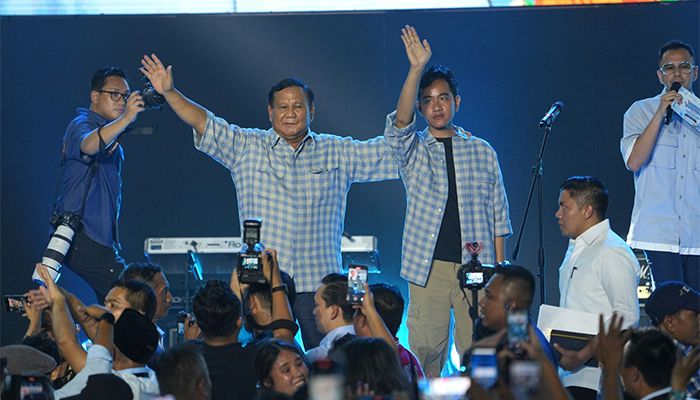
Desk Report
Publish: 15 Feb 2024, 01:59 pm

Prabowo Subianto || Photo: Collected
Indonesian Defence Minister Prabowo Subianto has declared victory in the presidential election after unofficial vote counts showed him with a significant lead over his rivals.
The 72-year-old former special forces commander, who had run unsuccessfully for president twice before, had about 58 percent of the votes, according to four pollsters, based on “quick count” ballots at samples of voting stations nationwide. The number of ballots tallied ranged from about 86 to 95 percent as of 14:00 GMT on Wednesday.
Rivals Anies Baswedan and Ganjar Pranowo trailed with about 25 percent and 17 percent, respectively, according to the independent pollsters conducting the counts, which have provided an accurate picture of the results of previous presidential elections held in the country since it began direct voting for the president in 2004.
A preliminary count by the election commission was far slower and showed Prabowo securing 57.7 percent of votes, with about 6 percent of ballots recorded.
Prabowo addressed his jubilant supporters at a stadium in Jakarta, and said he was “grateful” for the quick results.
Dressed in matching pale blue checked shirts, he was accompanied by his running mate, Gibran Rakabuming Raka, the eldest son of outgoing President Joko Widodo.
“We should not be arrogant, we should not be proud, we should not be euphoric, we still have to be humble, this victory must be a victory for all Indonesian people,” he said in a speech broadcast on national television.
Neither Anies nor Ganjar conceded, and urged the public to wait for the official result, which is expected by March 20 at the latest.
“We have to respect the people’s decision,” Anies told reporters at his campaign headquarters after Prabowo claimed victory.
Ganjar’s campaign team said they were investigating reports of electoral violations, calling it “structural, systematic and massive fraud” without providing evidence to back up the claim.
To win in a single round, a candidate needs more than 50 percent of votes cast and at least 20 percent of the ballot in half of the country’s provinces. If no candidate wins a majority, a run-off between the top two finishers will be held in June.
Jokowi effect
Prabowo was the front-runner going into the poll, thanks to the apparent support of Widodo, popularly known as Jokowi.
Gibran, the 36-year-old mayor of Solo, was named Prabowo’s running mate after a controversial court ruling on age limits where Widodo’s brother-in-law was one of the judges.
On the campaign trail Prabowo and Gibran pledged to continue the policies of Jokowi, who retained an approval rating of about 80 percent but was barred under the constitution from running again.
While Widodo was the first Indonesian president to emerge from the political and military elite since the collapse of the hardline rule of Soeharto 25 years ago, and has been accused of trying to build a political dynasty.
There were protests condemning Jokowi’s alleged election interference in the run up to the poll.
“The victory marks the final act in Jokowi’s political transformation: from humble political outsider and would-be reformist to a savvy political operator who presided over years of democratic backsliding and the founder of a new political dynasty accused of tipping the scales in Wednesday’s election,” Andreyka Natalegawa, an associate fellow in the Southeast Asia programme of the Centre for Strategic and International Studies, wrote in an analysis of the election. “While Jokowi will leave office in October, it is abundantly clear that he will remain a central figure in Indonesian politics for years to come.”
Prabowo’s apparent success also marks a significant milestone in the political evolution of Prabowo, a former Kopassus special forces commander who was once son-in-law to Soeharto.
Prabowo was given a dishonourable discharge in 1998 after claims that the group kidnapped and tortured political opponents of Soeharto as his regime crumbled. Of 22 activists kidnapped that year, 13 remain missing, and while Prabowo never faced trial, several of his men were tried and convicted.
He has also been accused of human rights abuses in East Timor, which won independence from Indonesia amid the collapse of the Soeharto regime, and in Indonesia’s troubled eastern region of Papua.
Ian Wilson, a senior political lecturer at Murdoch University’s Indo-Pacific Research Centre in Australia, told Al Jazeera that the former commander changed his approach during this election.
“He targeted a younger demographic by remaking his image through cartoon figures, as a cuddly uncle, casting a kind of a doubt over his human rights record, which for a younger generation is sort of an ancient history for the most part,” he said.
They will inherit an economy that grew just over 5 percent last year, and a slate of ambitious infrastructure projects, including the transfer of the capital from Jakarta to the island of Borneo.
Subscribe Shampratik Deshkal Youtube Channel
© 2024 Shampratik Deshkal All Rights Reserved. Design & Developed By Root Soft Bangladesh